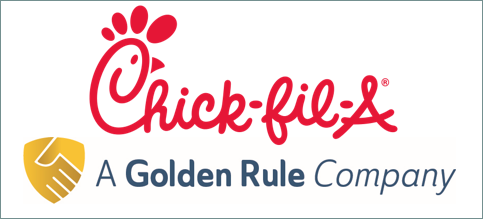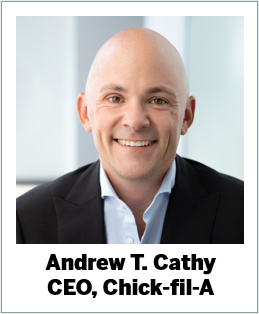Chick fil-A: A Golden Rule Pioneer
By Bruce Bolger
Click here to subscribe to the ESM weekly e-newsletter.
Founded in 1946 by an avowed Christian, S. Truett Cathy, it should come as no surprise the company could be eligible for earning a Golden Rule
 designation. Based on its reputational issues among progressives about inclusivity and sustainability issues, I might take some flack for this selection.
designation. Based on its reputational issues among progressives about inclusivity and sustainability issues, I might take some flack for this selection. Chick-fil-A, Atlanta, one of the largest US fast-food restaurant chains, is long recognized for strong customer loyalty, distinctive values-driven operations, and local community engagement. The company has demonstrated notable success in creating value for customers, employees, franchise operators, and communities from its very start.
Companies and leaders for this designation are informally evaluated by scoring its practices for each stakeholder group and are not penalized for religious beliefs of the founders. The general question is, would the world be a better place if every organization operated to these standards. What Chick-fil-A loses for scoring in terms of reputational issues related to sustainability and equity, it gains not only for efforts to address those issues but for its long history of commitment to employees, customers, and communities relative to most companies going back decades.
Yes, the company has faced criticism regarding inclusivity and sustainability practices. When the chain opened its first store in Manhattan in 2015, it drew wide protests for its donations to groups perceived to oppose gay rights. Today, the NY store reportedly has among the highest sales of any Chick fil A location. The company reportedly has backed off some of its environmental and animal treatment standards but generally is considered to have an above average record in fast food.
 Despite the grueling work involved with working in fast food, the company earns a relatively high 3.9 Glassdoor rating, with 72% saying they would recommend working there to a friend. Current CEO Andrew T. Cathy has an 89% approval rating. The company publishes an annual sustainability report that addresses its principles related to managing relationships with all stakeholders and the planet with some goals and metrics.
Despite the grueling work involved with working in fast food, the company earns a relatively high 3.9 Glassdoor rating, with 72% saying they would recommend working there to a friend. Current CEO Andrew T. Cathy has an 89% approval rating. The company publishes an annual sustainability report that addresses its principles related to managing relationships with all stakeholders and the planet with some goals and metrics.The company receives consistently high ratings among fast-food companies, with a culture based on courtesy, attentiveness and reliability. The company makes major contributions to employee development and is considered to have above average training support. Its policy of closing its stores on Sundays demonstrates a commitment to values over a pure-profit commitment.
It’s unique franchise model has a very low entry cost but only selects a small percentage of applications. Franchisees do not actually own the location or real estate and generally cannot operate more than one store, limiting upward income despite generous pay and profit sharing.
Privately held, it does not report sales or profits, but it continues to expand, adding nearly 150 stores last year. It reportedly has the highest market share in the chicken-focused fast-food industry.
Enterprise Engagement Alliance Services
 Celebrating our 15th year, the Enterprise Engagement Alliance helps organizations enhance performance through:
Celebrating our 15th year, the Enterprise Engagement Alliance helps organizations enhance performance through:1. Information and marketing opportunities on stakeholder management and total rewards:
- ESM Weekly on stakeholder management since 2009. Click here to subscribe; click here for media kit.
- RRN Weekly on total rewards since 1996. Click here to subscribe; click here for media kit.
- EEA YouTube channel on enterprise engagement, human capital, and total rewards since 2020
 Management Academy to enhance future equity value for your organization.
Management Academy to enhance future equity value for your organization.3. Books on implementation: Enterprise Engagement for CEOs and Enterprise Engagement: The Roadmap.
4. Advisory services and research: Strategic guidance, learning and certification on stakeholder management, measurement, metrics, and corporate sustainability reporting.
5. Permission-based targeted business development to identify and build relationships with the people most likely to buy.
Contact: Bruce Bolger at TheICEE.org; 914-591-7600, ext. 230.














